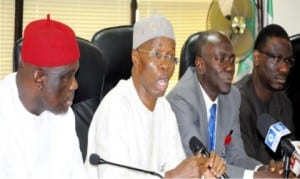Oil & Energy
Nigerians Want FG To Discontinue Fuel Subsidy Payment

L-R: National President, Independent Petroleum Marketers Association of Nigeria (ipman), Chief Obasi Lawrence, Permanent Secretary, Ministry of Petroleum Resources, Mr taiye Haruna, Executive Secretary, Major Oil Marketers Association of Nigeria (moman), Mr Obafemi Olawore and representative of the Group Managing Director of nnpc, Dr David Ige, at a stakeholders meeting to address the current petrol scarcity tagged: petrol queues must go, in Abuja, recently. Photo: NAN
A cross section of Nigeri
ans on Wednesday urged the Federal Government to discontinue its subsidy payment policy to marketers importing fuel.
The respondents told newsmen in Lagos that removal of petroleum subsidy would be good for Nigeria’s prosperity.
The Director, Centre for Bee Research and Development, Mr Bidemi Ojelewe, said that the controversy about the fuel subsidy payments was demoralising to the populace, and noted that the country’s economy would rapidly develop and prosper if normalcy reigned over subsidy payments to marketers.
“Removal of fuel subsidy is inevitable if our government wish to meet the pressing anticipation of the masses,’’ he said.
Prof. Michael Akur, who lectures at the Department of Political Science, University of Jos, said: “The discontinuance of subsidy on fuel consumption will reduce the inflationary pressures our economy is facing.
“We should have a departure of the subsidy era as soon as possible.
“This departure is necessary because our economy has not grown in the manner it ought to.
“This economy will not progress if government continue to subsidise consumption of commodities such as fuel and the likes,’’ he said.
A civil servant, Mr Shuaibu Yusuf, urged the Federal Government to scrap the programme of fuel subsidy payment and disburse funds earned by such scrapping to revamp the power sector.
“Our power sector is one area that needs more funds to be revamped.
“The money realised from the stoppage of subsidy payment should go into solving other challenges in other sectors.
“Government should introduce a modern mass transit scheme across the country so that ordinary citizens will not fill the impact of subsidy removal if eventually done,’’ he said.
A proprietor of a medium-size enterprise in Lagos, Mr Akeem Ogidan, said that the Federal Government policy to part finance cost of fuel consumed by Nigerians was not sustainable.
Ogidan, the Chief Executive Officer, Tanke Paper Mills, said that governments at all levels needed to pursue policies that would save and earn for them more money.
He also noted that to continue the fuel subsidy policy in era of declining oil prices in the international market would worsen Nigeria’s economy.
“We must get rid of the subsidy scheme especially in this dispensation where austerity is been experienced in virtually all states in the Nigerian federation.
“Almost half of the state governors cannot pay salaries and the reality is that the need of sustaining the subsidy is not tenable,’’ Ogidan said.
According to the Nigerian Extractive Industries Transparency Initiative (NEITI), the federal government spent a whopping N4.5 trillion on fuel subsidy claims between 2006 and 2012.
An economist, Mr Bismarck Rewane, has also advised the Federal Government to remove the fuel subsidy on petroleum products for speedy development of the country.
Rewane, the Managing Director of Financial Derivatives Limited, made the call in a lecture on “The Nigerian Economy and Business Outlook”.
He delivered the lecture at the Annual General Meeting of the International Chamber of Commerce Nigeria in Lagos on Thursday.
Rewane said that the subsidy regime was fraught with corruption and gains from subsidy removal should be utilised for projects that would develop the nation as against enriching few Nigerians.
He said that subsidy removal would reduce the country’s huge debt profile, block government leakages and aid rehabilitation of refineries and depots in the country.
According to him, the falling global crude oil price which has caused a dip in the nation’s revenue necessitated a stop to fuel subsidy payment.
“If the government does not remove the fuel subsidy, the subsidy payment will cripple the economy of the country, “Rewane said.
He said that the removal of fuel subsidy would reduce government’s financial burden and drive the growth of the economy.
Oil & Energy
NERC, OYSERC Partner To Strengthen Regulation

Oil & Energy
NLC Faults FG’s 3trn Dept Payment To GenCos

Oil & Energy
PENGASSAN Rejects Presidential EO On Oil, Gas Revenue Remittance ……… Seeks PIA Review

-

 News2 days ago
News2 days agoAmend Constitution To Accommodate State Police, Tinubu Tells Senators
-

 Politics2 days ago
Politics2 days agoSenate Urges Tinubu To Sack CAC Boss
-

 News2 days ago
News2 days agoDisu Takes Over As New IGP …Declares Total War On Corruption, Impunity
-
Business2 days ago
President Tinubu Extends Raw Shea Nuts Export Ban To 2027
-
Business2 days ago
Crisis Response: EU-project Delivers New Vet. Clinic To Katsina Govt.
-
Business2 days ago
President Tinubu Approves Extension Ban On Raw Shea Nut Export
-
Sports2 days ago
NDG: Rivers Coach Appeal To NDDC In Talent Discovery
-
Rivers2 days ago
Etche Clan Urges Govt On Chieftaincy Recognition

